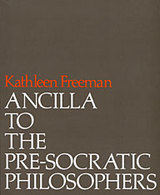

Edited by leading scholars in the field and with contributions from important scholars of postwar theater, this volume considers, for the first time, the whole body of Wesker’s work. It includes chapters on Wesker’s reception in Europe, his representation of and attitude towards women, his relationship to his Jewish origins and identity, and his attitude toward politics and community. Building on existing scholarship, drawing extensively from the Arnold Wesker archive at the Harry Ransom Center at the University of Texas at Austin, and introducing new insights and perspectives, this important new essay collection remedies the recent critical neglect of the dramatist.
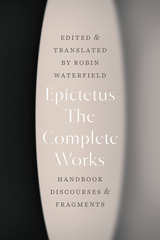
“Some things are up to us and some are not.”
Epictetus was born into slavery around the year 50 CE, and, upon being granted his freedom, he set himself up as a philosophy teacher. After being expelled from Rome, he spent the rest of his life living and teaching in Greece. He is now considered the most important exponent of Stoicism, and his surviving work comprises a series of impassioned discourses, delivered live and recorded by his student Arrian, and the Handbook, Arrian’s own take on the heart of Epictetus’s teaching.
In Discourses, Epictetus argues that happiness depends on knowing what is in our power to affect and what is not. Our internal states and our responses to events are up to us, but the events themselves are assigned to us by the benevolent deity, and we should treat them—along with our bodies, possessions, and families—as matters of indifference, simply making the best use of them we can. Together, the Discourses and Handbook constitute a practical guide to moral self-improvement, as Epictetus explains the work and exercises aspirants need to do to enrich and deepen their lives. Edited and translated by renowned scholar Robin Waterfield, this book collects the complete works of Epictetus, bringing to modern readers his insights on how to cope with death, exile, the people around us, the whims of the emperor, fear, illness, and much more.
CUSTOMER NOTE: THE HARDCOVER IS FOR LIBRARIES AND HAS NO JACKET.
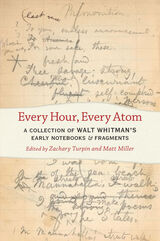
Some of the dimmest years in Walt Whitman’s life precede the advent of Leaves of Grass in 1855, when he was working as a journalist and fiction writer. Starting around 1850, what he’d begun writing in his personal notebooks was far more enigmatic than anything he’d done before.
One of Whitman’s most secretive projects during this timeframe was a novel, Life and Adventures of Jack Engle; serialized anonymously in the spring of 1852, and rediscovered and properly published in 2017. The key to the novel’s later discovery were plot notes Whitman had made in one of his private notebooks.
Whitman’s invaluable notebooks have been virtually inaccessible to the public, until now. Maintaining the early notebooks’ wild, syncretic feel and sample illustrations of Whitman’s beautiful and unkempt pages, scholars Zachary Turpin and Matt Miller’s thorough transcriptions have made these notebooks available to all; sharing Whitman’s secret space for developing his poetry, his writing, his philosophy, and himself.

Tantalizing quotations from lost tragedies.
Aeschylus (ca. 525–456 BC), the dramatist who made Athenian tragedy one of the world’s great art forms, witnessed the establishment of democracy at Athens, fought against the Persians at Marathon and probably also at Salamis, and had one of his productions sponsored by the young Pericles. He was twice invited to visit Sicily, and it was there that he died. At Athens he competed for the tragic prize at the City Dionysia about nineteen times between circa 499 and 458, and won it on thirteen occasions; in his later years he was probably victorious almost every time he put on a production, though Sophocles beat him at least once.
Of his total of about eighty plays, seven survive complete. The first volume of this new Loeb Classical Library edition contains fresh texts and translations by Alan H. Sommerstein of Persians (472), on the recent war, the only surviving Greek historical drama; Seven against Thebes (467), the third play of a trilogy, on the conflict between Oedipus’ sons which ends when they kill each other; Suppliants, the first or second play of a trilogy, on the successful appeal by the daughters of Danaus to the king and people of Argos for protection against a forced marriage to their cousins (whom they will later murder, all but one); and Prometheus Bound (of disputed authenticity), on the terrible punishment of Prometheus for giving fire to humans in defiance of Zeus (with whom he will later be reconciled after preventing his overthrow). The second volume contains the complete Oresteia trilogy (458), comprising Agamemnon, Libation-Bearers, and Eumenides, presenting the murder of Agamemnon by his wife, the revenge taken by their son Orestes, the pursuit of Orestes by his mother’s avenging Furies, his trial and acquittal at Athens, Athena’s pacification of the Furies, and the blessings they both invoke upon the Athenian people.
This edition’s third volume offers all the major fragments of lost Aeschylean plays, with brief headnotes explaining what is known, or can be plausibly inferred, about their content, and bibliographies of recent studies.

The master of Old Comedy.
The eleven plays by Aristophanes that have come down to us intact brilliantly illuminate the eventful period spanned by his forty-year career, beginning with the first production in 427 BC. But the Athenians knew much more of his work: over forty plays by Aristophanes were read in antiquity, of which nearly a thousand fragments survive. These provide a fuller picture of the poet’s ever astonishing comic vitality and a wealth of information and insights about his world. Jeffrey Henderson’s new, widely acclaimed Loeb edition of Aristophanes is completed by this volume containing what survives from, and about, his lost plays, hitherto inaccessible to the nonspecialist, and incorporating the enormous scholarly advances that have been achieved in recent years.
Each fragmentary play is prefaced by a summary of what can be inferred about its plot, characters, themes, theatricality, and topical significance. Also included in this edition are the ancient reports about Aristophanes’ life, works, and influence on the later comic tradition.
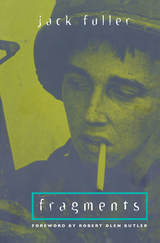
"[Fragments] makes the usual semi-autobiographical account [of the Vietnam War] . . . seem flimsy and discursive in comparison. . . . The shapeliness and sense of larger design [is] so elegantly executed in Fragments."—Michiko Kakutani, New York Times
"The plot is believable, the characters sharply drawn, the prose clean and distinctive. . . . Stand[s] with Tim O'Brien's Going After Cacciato, James Webb's Fields of Fire, Josiah Bunting's The Lionheads and John Del Vecchio's The 13th Valley. . . . A strong, compelling novel."—Marc Leepson, Washington Post
"There have been many books on Vietnam, and there will be many others. This is more a novel than the rest. . . . Fuller has reassembled the exploded grenade."—Bob MacDonald, Boston Sunday Globe
"Should our children ask about Vietnam, we would not go wrong to place this book in their hands. . . . [Fragments] purveys more than information—it gives the war a literary form."—David Myers, New York Times
"The best novel yet about the Vietnam War. . . . It ranks with Norman Mailer's The Naked and the Dead and James Jones's From Here to Eternity."—Daniel Kornstein, Wall Street Journal

Ancient Athens’ most successful tragedian.
Sophocles (497/6–406 BC), the second of the three great tragedians of Athens and by common consent one of the world's greatest poets, wrote more than 120 plays. Only seven of these survive complete, but we have a wealth of fragments, from which much can be learned about Sophocles' language and dramatic art. This volume presents a collection of all the major fragments, ranging in length from two lines to a very substantial portion of the satyr play The Searchers. Prefatory notes provide frameworks for the fragments of known plays.
Many of the Sophoclean fragments were preserved by quotation in other authors; others, some of considerable size, are known to us from papyri discovered during the past century. Among the lost plays of which we have large fragments, The Searchers shows the god Hermes, soon after his birth, playing an amusing trick on his brother Apollo; Inachus portrays Zeus coming to Argos to seduce Io, the daughter of its king; and Niobe tells how Apollo and his sister Artemis punish Niobe for a slight upon their mother by killing her twelve children. Throughout the volume, as in the extant plays, we see Sophocles drawing his subjects from heroic legend.
This is the final volume of Lloyd-Jones's Loeb Classical Library edition of Sophocles. In Volumes I and II he gives a faithful and very skillful translation of the seven surviving plays. Volume I contains Oedipus Tyrannus, Ajax, and Electra. Volume II contains Oedipus at Colonus, Antigone, The Women of Trachis, and Philoctetes.
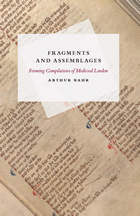
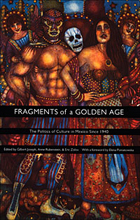
Each essay in its own way addresses the fragmentation of a cultural consensus that prevailed during the “golden age” of post–revolutionary prosperity, a time when the state was still successfully bolstering its power with narratives of modernization and shared community. Combining detailed case studies—both urban and rural—with larger discussions of political, economic, and cultural phenomena, the contributors take on such topics as the golden age of Mexican cinema, the death of Pedro Infante as a political spectacle, the 1951 “caravan of hunger,” professional wrestling, rock music, and soap operas.
Fragments of a Golden Age will fill a particular gap for students of modern Mexico, Latin American studies, cultural studies, political economy, and twentieth century history, as well as to others concerned with rethinking the cultural dimensions of nationalism, imperialism, and modernization.
Contributors. Steven J. Bachelor, Quetzil E. Castañeda, Seth Fein, Alison Greene, Omar Hernández, Jis & Trino, Gilbert M. Joseph, Heather Levi, Rubén Martínez, Emile McAnany, John Mraz, Jeffrey M. Pilcher, Elena Poniatowska, Anne Rubenstein, Alex Saragoza, Arthur Schmidt, Mary Kay Vaughan, Eric Zolov
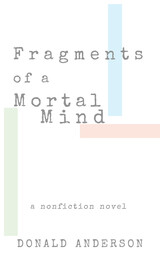
At once a memoir, a reading journal, and a novel, Fragments of a Mortal Mind is a daring, contemporary commonplace book. Donald Anderson, critically acclaimed author of Gathering Noise from My Life and Below Freezing, shows us how the disparate elements of our lives collect to construct our deepest selves and help us to make sense of it all. Anderson layers his personal experiences and reflections with those of others who have wrestled with inner and outer social, cultural, and political memories that are not as accurate as history might suggest but that each of us believe nonetheless. He challenges the reader’s sense of memory and fact, downplaying the latter in explaining how each of us crafts our own personal histories.
As Anderson weaves his voice among numerous other voices and ideas that rest upon other ideas, we are faced with larger issues of human existence: war, memory, trauma, mortality, religion, fear, joy, ugliness, and occasional beauty. What we have here is a meditation on living in America. We are shown how the world we consume becomes us as we metabolize it. How we, as humans, through our own fragments of memories, influences, and experiences become our true selves. By charting fragments of thoughts over a lifetime, Anderson exposes a way of thinking and perceiving the world that is refreshingly intuitive and desperately needed. Fragments of a Mortal Mind is a powerful masterpiece that closely resembles our lived experiences and is a vivid reflection of our time.

Today, William of Auvergne (1180?–1249) is remembered for his scholarship about the afterlife as well as the so-called Trial of the Talmud. But the medieval bishop of Paris also left behind nearly 600 sermons delivered to all manner of people—from the royal court to the poorest in his care. In Fragments of a World, Lesley Smith uses these sermons to paint a vivid picture of this extraordinary cleric, his parishioners, and their bustling world. The first modern biography of the influential teacher, bishop, and theologian, Fragments of a World casts a new image of William of Auvergne for our times—deeply attuned to both the spiritual and material needs of an ever-changing populace in the medieval city.
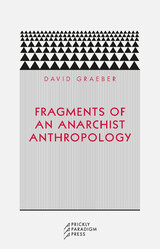
This pamphlet ponders what that response would be, and explores the implications of linking anthropology to anarchism. Here, David Graeber invites readers to imagine this discipline that currently only exists in the realm of possibility: anarchist anthropology.
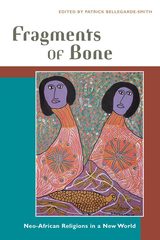
In Fragments of Bone, thirteen essayists discuss African religions as forms of resistance and survival in the face of Western cultural hegemony and imperialism. The collection presents scholars working outside of the Western tradition with backgrounds in a variety of disciplines, genders, and nationalities. These experts draw on research, fieldwork, personal interviews, and spiritual introspection to support a provocative thesis: that fragments of ancestral traditions are fluidly interwoven into New World African religions as creolized rituals, symbolic systems, and cultural identities.
Contributors: Osei-Mensah Aborampah, Niyi Afolabi, Patrick Bellegarde-Smith, Randy P. Conner, T. J. Desch-Obi, Ina Johanna Fandrich, Kean Gibson, Marilyn Houlberg, Nancy B. Mikelsons, Roberto Nodal, Rafael Ocasio, Miguel "Willie" Ramos, and Denise Ferreira da Silva

Fragments of Culture shows how attention to the minutiae of daily life can successfully unravel the complexities of a shifting society. This book makes a significant contribution to both modern Turkish studies and the scholarship on cross-cultural perspectives in Middle Eastern studies.
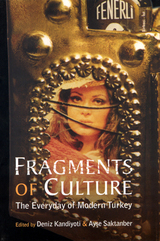
In this volume, some of the most innovative scholars of post 1980s Turkey address the complex ways that suburbanization and the growth of a globalized middle class have altered gender and class relations, and how Turkish society is being shaped and redefined through consumption. They also explore the increasingly polarized cultural politics between secularists and Islamists, and the ways that previously repressed Islamic elements have reemerged to complicate the idea of an "authentic" Turkish identity. Contributors examine a range of issues from the adjustments to religious identity as the Islamic veil becomes marketed as a fashion item, to the media's increased attention in Turkish transsexual lifestyle, to the role of folk dance as a ritualized part of public life. Fragments of Culture shows how attention to the minutiae of daily life can successfully unravel the complexities of a shifting society. This book makes a significant contribution to both modern Turkish studies and the scholarship on cross-cultural perspectives in Middle Eastern studies.
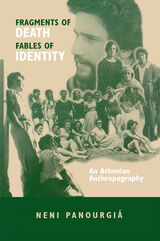
The death of her grandfather sets Neni Panourgiá and her readers on a path through the rituals of mourning and memory in modern urban Greece. Blending emotional richness and intellectual rigor, the anthropologist returns home in this exploration of kinship and identity within her own family and native city of Athens. What emerges is not only a new anthropological view of contemporary Greek culture, but also a reflective consideration of the self and subject.
Following men and women grappling with questions of mortality, Panourgiá moves through the streets and neighborhoods of Athens, seaside resorts and pistachio groves, the corridors and rooms of the Cancer Institute, wakes in apartments and observances in cemeteries. She mingles popular culture, venerable traditions, and contemporary theory as she considers how individuals define their identity as Athenians, as members of a family, as subjects of a polity, in sickness and in health, in death or in mourning. Memory is their guide as it negotiates their relationships with a personal, collective, and cultural past—and the memory of many deaths challenges and reaffirms, deconstructs and reconstructs who they are.
As intellectually ambitious as it is moving, Fragments of Death, Fables of Identity reconfigures the subject and object of anthropological study and recasts the line where experience ends and analysis begins.
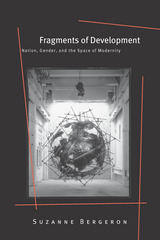
Bergeron's account of the construction of the national economy as an object of development policy follows its shifting meanings through modernization and growth models, dependency theory, structural adjustment, and contemporary debates about globalization and highlights how intersections of nation and economy are based on gendered and colonial scripts. The author's analysis of development debates effectively demonstrates that critics of development who ignore economists' nation stories may actually bolster the formation they are attempting to subvert. Fragments of Development is essential reading for those interested in development studies, feminist economics, international political economy, and globalization studies.
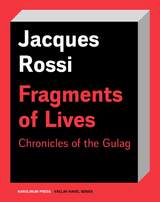
An impassioned reminder to always question one’s beliefs, to have the courage to give up one’s illusions at the risk of one’s life, Fragments of Lives lays bare, with acute observations and biting wit, the falsity of the Soviet utopia that transformed Rossi’s home into a “huge Potemkin village, a farcical sham dissimulating oceans of mud and blood.”
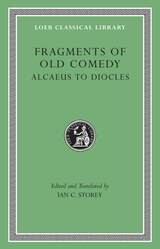
Laughter in stitches.
The era of Old Comedy (ca. 485 – ca. 380 BC), when theatrical comedy was created and established, is best known through the extant plays of Aristophanes, but there were many other poets whose comedies survive only in fragments. This new Loeb edition, the most extensive selection of the fragments available in English, presents the work of more than fifty-five poets, including Cratinus and Eupolis, the other members (along with Aristophanes) of the canonical Old Comic triad.
For each poet and play there is an introduction, and for many there are brief notes and recent bibliography. Also included are a selection of ancient testimonia to Old Comedy, nearly one hundred unattributed fragments (both book and papyri), and descriptions of thirty vase paintings illustrating Old Comic scenes. The texts are based on the monumental edition of Kassel and Austin, updated to reflect the latest scholarship. The complete Loeb Fragments of Old Comedy is in three volumes.
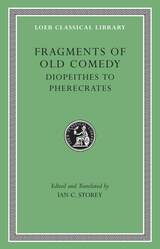
Laughter in stitches.
The era of Old Comedy (ca. 485 – ca. 380 BC), when theatrical comedy was created and established, is best known through the extant plays of Aristophanes, but there were many other poets whose comedies survive only in fragments. This new Loeb edition, the most extensive selection of the fragments available in English, presents the work of more than fifty-five poets, including Cratinus and Eupolis, the other members (along with Aristophanes) of the canonical Old Comic triad.
For each poet and play there is an introduction, and for many there are brief notes and recent bibliography. Also included are a selection of ancient testimonia to Old Comedy, nearly one hundred unattributed fragments (both book and papyri), and descriptions of thirty vase paintings illustrating Old Comic scenes. The texts are based on the monumental edition of Kassel and Austin, updated to reflect the latest scholarship. The complete Loeb Fragments of Old Comedy is in three volumes.
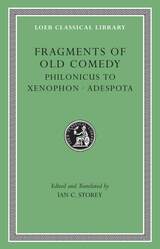
Laughter in stitches.
The era of Old Comedy (ca. 485 – ca. 380 BC), when theatrical comedy was created and established, is best known through the extant plays of Aristophanes, but there were many other poets whose comedies survive only in fragments. This new Loeb edition, the most extensive selection of the fragments available in English, presents the work of more than fifty-five poets, including Cratinus and Eupolis, the other members (along with Aristophanes) of the canonical Old Comic triad.
For each poet and play there is an introduction, and for many there are brief notes and recent bibliography. Also included are a selection of ancient testimonia to Old Comedy, nearly one hundred unattributed fragments (both book and papyri), and descriptions of thirty vase paintings illustrating Old Comic scenes. The texts are based on the monumental edition of Kassel and Austin, updated to reflect the latest scholarship. The complete Loeb Fragments of Old Comedy is in three volumes.
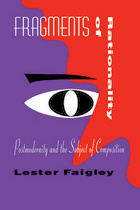
In an insightful assessment of the study and teaching of writing against the larger theoretical, political, and technological upheavals of the past thirty years, Fragments of Rationality questions why composition studies has been less affected by postmodern theory than other humanities and social science disciplines.
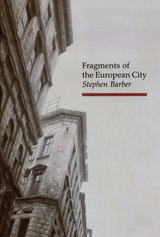
Taking as its subject the "intricately assembled, relentlessly disassembling metropolitan screen", it charts the virulent implosions of culture, the distortions and violence that give city-living its fractured and hallucinatory quality.
Provocatively written as a series of inter-locking poetic fragments, the text evokes the formation of metropolitan "identity" as it ricochets between the physical surface of the city and the vulnerable but manipulating consciousness of city dwellers.
Barber has discovered a powerful new vocabulary – a vocabulary charged with the visual and sonic impact of the cinema. Like the city, the text pulsates, creatively chaotic, raw and exhilarating.

Chronicles of a Caesarean partisan.
Sallust, Gaius Sallustius Crispus (86–35 BC), a Sabine from Amiternum, acted as tribune against Cicero and Milo in 52, joined Caesar after being expelled from the Senate in 50, was restored to the Senate by Caesar and took part in his African campaign as praetor in 46, and was then appointed governor of New Africa (Numidia). Upon his return to Rome he narrowly escaped conviction for malfeasance in office, retired from public life, and took up historiography. Sallust’s last work, the annalistic Histories in five books, is much more expansive than his monographs on Catiline and Jugurtha (LCL 116), treating the whole of Roman history at home and abroad in the post-Sullan age. Although fragmentary, it provides invaluable information and insight about a crucial period of history spanning the period from 78 to around 67 BC.
Although Sallust is decidedly unsubtle and partisan in analyzing people and events, his works are important and significantly influenced later historians, notably Tacitus. Taking Thucydides as his model but building on Roman stylistic and rhetorical traditions, Sallust achieved a distinctive style, concentrated and arresting; lively characterizations, especially in the speeches; and skill at using particular episodes to illustrate large general themes.
For this volume, which completes the Loeb Classical Library edition of Sallust’s works, John T. Ramsey has freshly edited the Histories and the two pseudo-Sallustian Letters to Caesar, supplying ample annotation.
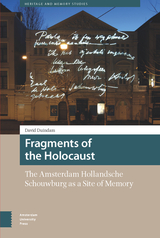
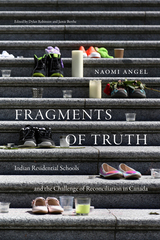
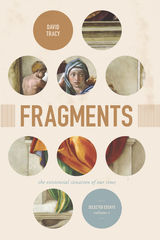
In the first volume, Fragments, Tracy gathers his most important essays on broad theological questions, beginning with the problem of suffering across Greek tragedy, Christianity, and Buddhism. The volume goes on to address the Infinite, and the many attempts to categorize and name it by Plato, Aristotle, Rilke, Heidegger, and others. In the remaining essays, he reflects on questions of the invisible, contemplation, hermeneutics, and public theology. Throughout, Tracy evokes the potential of fragments (understood both as concepts and events) to shatter closed systems and open us to difference and Infinity. Covering science, literature, philosophy, psychoanalysis, and non-Western religious traditions, Tracy provides in Fragments a guide for any open reader to rethink our fragmenting contemporary culture.

Lost works by ancient Greece’s third great tragedian.
Eighteen of the ninety or so plays composed by Euripides between 455 and 406 BC survive in a complete form and are included in the preceding six volumes of the Loeb Euripides. A further fifty-two tragedies and eleven satyr plays, including a few of disputed authorship, are known from ancient quotations and references and from numerous papyri discovered since 1880. No more than one-fifth of any play is represented, but many can be reconstructed with some accuracy in outline, and many of the fragments are striking in themselves. The extant plays and the fragments together make Euripides by far the best known of the classic Greek tragedians.
This edition, in a projected two volumes, offers the first complete English translation of the fragments together with a selection of testimonia bearing on the content of the plays. The texts are based on the recent comprehensive edition of R. Kannicht. A general Introduction discusses the evidence for the lost plays. Each play is prefaced by a select bibliography and an introductory discussion of its mythical background, plot, and location of the fragments, general character, chronology, and impact on subsequent literary and artistic traditions.

Lost works by ancient Greece’s third great tragedian.
Eighteen of the ninety or so plays composed by Euripides between 455 and 406 BC survive in a complete form and are included in the preceding six volumes of the Loeb Euripides. A further fifty-two tragedies and eleven satyr plays, including a few of disputed authorship, are known from ancient quotations and references and from numerous papyri discovered since 1880. No more than one-fifth of any play is represented, but many can be reconstructed with some accuracy in outline, and many of the fragments are striking in themselves. The extant plays and the fragments together make Euripides by far the best known of the classic Greek tragedians.
This edition, in a projected two volumes, offers the first complete English translation of the fragments together with a selection of testimonia bearing on the content of the plays. The texts are based on the recent comprehensive edition of R. Kannicht. A general Introduction discusses the evidence for the lost plays. Each play is prefaced by a select bibliography and an introductory discussion of its mythical background, plot, and location of the fragments, general character, chronology, and impact on subsequent literary and artistic traditions.

Friedrich Schlegel's Lucinde and the Fragments was first published in 1971. Minnesota Archive Editions uses digital technology to make long-unavailable books once again accessible, and are published unaltered from the original University of Minnesota Press editions.
For the last century and a half, Friedrich Schlegel (1772–1829) has enjoyed a reputation for being the critical grey eminence behind the coming to power of the Romantic Movement. It was Schlegel, in his three series of aphoristic fragments (Lyceum, Athenaeum, and Ideas), who actually first defined and employed the word "romantic" in the present sense; and it was he who in a chaotic, fragmentary, and often mysterious but forceful manner first proclaimed the doctrine that was to usher in the modern age in literature. He too was among the first to put his new program into practice in the shape of his unfinished Lucinde,a work variously denounced as pornography and heralded as a forerunner of modern novelistic experimentation, and probably the most famous novel to come out of German Romanticism.
Both the Fragments and Lucinde,along with a brilliant tour de force, the "Essay on Incomprehensibility," are available now for the first time in a complete English translation in this volume, together with a brief scholarly introduction. This translation will enable non-German readers to examine at first hand the work of a man whom Rene Wellck has called "one of the greatest critics of history." At a time when the function of criticism is coming once again under close skeptical scrutiny, Friedrich Schlegel's unorthodox, unsystematic but seminal critical mind—all of literature, philosophy, art, and history were grist to his mill—should find many sympathetic readers. The book will be of particular interest to theorists of literature and fiction, comparative literature scholars, and historians of the intellectual history of Germany, and it is appropriate for course use in German and comparative literature classes.
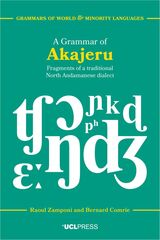
Originally spoken across the northern Andamanese Islands in the Bay of Bengal, the Akajeru language is spoken today by only three people. A Grammar of Akajeru describes this unique grammatical system as it was reported at the turn of the twentieth century. Based primarily on research conducted by Victorian anthropologists Alfred R. Radcliffe-Brown and Edward Horace Man, this book offers a linguistic analysis of all extant Akajeru material as well as the scant documentation of adjacent dialects Akabo and Akakhora. This volume includes a grammatical sketch of Akajeru, an English-Akajeru lexicon, and a comparison between Akajeru and present-day Andamanese.
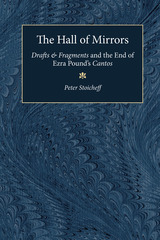

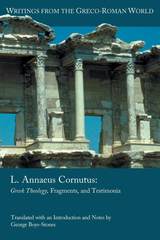
The first English translation of Greek Theology
The first-century CE North African philosopher Cornutus lived in Rome as a philosopher and is best known today for his surviving work Greek Theology, which explores the origins and names of the Greek gods. However, he was also interested in the language and literature of the poets Persius and Lucan and wrote one of the first commentaries on Virgil. This book collects and translates all of our evidence for Cornutus for the first time and includes the first published English translation of Greek Theology. This collection offers entirely fresh insight into the intellectual world of the first century.
Features
- Translation based on the latest critical text
- The first truly holistic picture of Cornutus’s intellectual profile
- A new account of the early debate over Aristotle’s Categories and the Stoic contribution to it

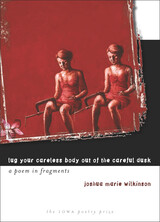
Drawing from the paintings of Susan Rothenberg, Gwyneth Scally, and Eric Fischl as well as from the photography of Allison Maletz, Joshua Marie Wilkinson’s Lug Your Careless Body out of the Careful Dusk is a book-length poem written in small fragments. Comprised of seven sections, the poem is formed as much by the poet’s travels through Turkey, the Baltics, and Eastern Europe as it is by the movies of Rainer Werner Fassbinder, Krzysztof Kieslowski, and Bill Morrison. The painters Francis Bacon and Lucian Freud are here alongside whispers of Emily Dickinson and Wallace Stevens. Lug Your Careless Body out of the Careful Dusk is a book of cinematic images and fragments, of small stories overheard and quickly abandoned, of hidden letters and phone booths, and of ghosts who return with questions.
Born and raised in Seattle’s Haller Lake neighborhood, Joshua Marie Wilkinson is the author of one other book of poetry, Suspension of a Secret in Abandoned Rooms, and the chapbook A Ghost as King of the Rabbits. He holds an MFA from the University of Arizona and an MA in film studies from University College Dublin. Presently he lives in Denver, Colorado, where he is pursuing his doctorate in English and creative writing and completing his first film.
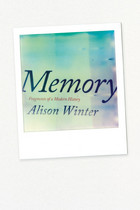
Picture your twenty-first birthday. Did you have a party? If so, do you remember who was there? Now step back: how clear are those memories? Should we trust them to be accurate, or is there a chance that you’re remembering incorrectly? And where have the many details you can no longer recall gone? Are they hidden somewhere in your brain, or are they gone forever?
Such questions have fascinated scientists for hundreds of years, and, as Alison Winter shows in Memory: Fragments of a Modern History, the answers have changed dramatically in just the past century. Tracing the cultural and scientific history of our understanding of memory, Winter explores early metaphors that likened memory to a filing cabinet; later, she shows, that cabinet was replaced by the image of a reel of film, ever available for playback. That model, too, was eventually superseded, replaced by the current understanding of memory as the result of an extremely complicated, brain-wide web of cells and systems that together assemble our pasts. Winter introduces us to innovative scientists and sensationalistic seekers, and, drawing on evidence ranging from scientific papers to diaries to movies, explores the way that new understandings from the laboratory have seeped out into psychiatrists' offices, courtrooms, and the culture at large. Along the way, she investigates the sensational battles over the validity of repressed memories that raged through the 1980s and shows us how changes in technology—such as the emergence of recording devices and computers—have again and again altered the way we conceptualize, and even try to study, the ways we remember.
Packed with fascinating details and curious episodes from the convoluted history of memory science, Memory is a book you'll remember long after you close its cover.
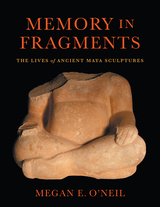
An exploration of how the ancient Maya engaged with their history by using, altering, and burying stone sculptures.
For the ancient Maya, monumental stone sculptures were infused with agency. As they were used, reused, altered, and buried, such sculptures retained ceremonial meaning. In Memory in Fragments, Megan E. O'Neil explores how ancient Maya people engaged with history through these sculptures, as well as how they interacted with the stones themselves over the course of the sculptures’ long “lives.” Considering Maya religious practices, historiography, and conceptions of materials and things, O’Neil explores how Maya viewers perceived sculptures that were fragmented, scarred, burned, damaged by enemies, or set in unusual locations. In each case, she demonstrates how different human interactions, amid dynamic religious, political, and historical contexts, led to new episodes in the sculptures' lives.
A rare example of cross-temporal and geographical work in this field, Memory in Fragments both compares sculptures within ancient Maya culture across Honduras, Guatemala, Mexico, and Belize over hundreds of years and reveals how memory may accrue around and be evoked in material remains.

Eclectic essays on ethics, education, and much else besides.
Plutarch (Plutarchus), ca. AD 45–120, was born at Chaeronea in Boeotia in central Greece, studied philosophy at Athens, and, after coming to Rome as a teacher in philosophy, was given consular rank by the emperor Trajan and a procuratorship in Greece by Hadrian. He was married and the father of one daughter and four sons. He appears as a man of kindly character and independent thought, studious and learned.
Plutarch wrote on many subjects. Most popular have always been the forty-six Parallel Lives, biographies planned to be ethical examples in pairs (in each pair, one Greek figure and one similar Roman), though the last four lives are single. All are invaluable sources of our knowledge of the lives and characters of Greek and Roman statesmen, soldiers and orators. Plutarch’s many other varied extant works, about sixty in number, are known as Moralia or Moral Essays. They are of high literary value, besides being of great use to people interested in philosophy, ethics, and religion.
The Loeb Classical Library edition of the Moralia is in fifteen volumes, volume XIII having two parts. Volume XVI is a comprehensive Index.

Ancient Roman word lore.
Varro (M. Terentius), 116–27 BC, of Reate, renowned for his vast learning, was an antiquarian, historian, philologist, student of science, agriculturist, and poet. He was a republican who was reconciled to Julius Caesar and was marked out by him to supervise an intended national library.
Of Varro’s more than seventy works involving hundreds of volumes we have only his treatise On Agriculture (in LCL 283) and part of his monumental achievement De Lingua Latina (On the Latin Language), a work typical of its author’s interest not only in antiquarian matters but also in the collection of scientific facts. Originally it consisted of twenty-five books in three parts: etymology of Latin words (Books 1–7); their inflections and other changes (Books 8–13); and syntax (Books 14–25). Of the whole work survive (somewhat imperfectly) Books 5–10. These are from the section (Books 4–6) that applied etymology to words of time and place and to poetic expressions; the section (Books 7–9) on analogy as it occurs in word formation; and the section (Books 10–12) that applied analogy to word derivation. Varro’s work contains much that is of very great value to the study of the Latin language.
The Loeb Classical Library edition of On the Latin Language is in two volumes.
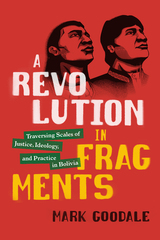
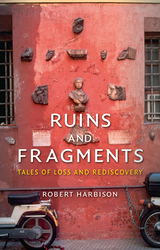
Harbison guides us through ruins and fragments, both ancient and modern, visual and textual, showing us how they are crucial to understanding our current mindset and how we arrived here. First looking at ancient fragments, he examines the ways we have recovered, restored, and exhibited them as artworks. Then he moves on to modernist architecture and the ways that it seeks a fragmentary form, examining modern projects that have been designed into existing ruins, such as the Castelvecchio in Verona, Italy and the reconstruction of the Neues Museum in Berlin. From there he explores literature and the works of T. S. Eliot, Montaigne, Coleridge, Joyce, and Sterne, and how they have used fragments as the foundation for creating new work. Likewise he examines the visual arts, from Schwitters’ collages to Ruskin’s drawings, as well as cinematic works from Sergei Eisenstein to Julien Temple, never shying from more deliberate creators of ruin, from Gordon Matta-Clark to countless graffiti artists.
From ancient to modern times and across every imaginable form of art, Harbison takes a poetic look at how ruins have offered us a way of understanding history and how they have enabled us to create the new.
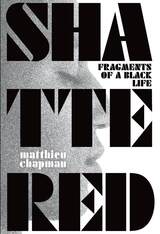
A heartrending and engrossing memoir that challenges narratives of racial progress and postracial America.
“Every so often, a book comes along that changes the way we see, speak, and think about the world. Shattered is one of those books.” —Frank B. Wilderson III, author of Afropessimism and Incognegro
From a distance, Matthieu Chapman’s life and accomplishments serve as an example of racial progress in America: the first in his family to go to college, he earns two master’s degrees and a doctorate and then becomes a professor of theater. Despite his personal and academic success, however, the specter of antiblackness continues to haunt his every moment and interaction.
Told through fragments, facets, shards, slivers, splinters, and absences, Shattered places Chapman’s own story in dialogue with US history and structural analysis of race to relay the experience of being very alive in a demonstrably antiblack society—laying bare the impact of the American way on black bodies, black psyches, and black lives. From the Church of Jesus Christ of Latter-day Saints to the offices of higher education, from a Loyal White Knights flyer on his windshield to a play with black students written by a black playwright, Chapman’s life story embodies the resistance that occurs, the shattering, collapsing, and reconfiguring of being that happens in the collisions between conceptions of blackness. Shattered is a heartrending and thought-provoking challenge to narratives of racial progress and postracial America—an important reminder that systemic antiblack racism affects every black person regardless of what they achieve in spite of it.
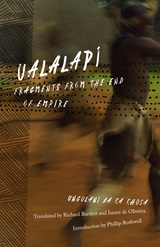
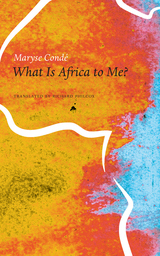
What Is Africa to Me? traces the late 1950s to 1968, chronicling Condé’s life in Sékou Touré’s Guinea to her time in Kwame N’Krumah’s Ghana, where she rubbed shoulders with Malcolm X, Che Guevara, Julius Nyerere, and Maya Angelou. Accusations of subversive activity resulted in Condé’s deportation from Ghana. Settling down in Sénégal, Condé ended her African years with close friends in Dakar, including filmmakers, activists, and Haitian exiles, before putting down more permanent roots in Paris.
Condé’s story is more than one of political upheaval, however; it is also the story of a mother raising four children as she battles steep obstacles, of a Guadeloupean seeking her identity in Africa, and of a young woman searching for her freedom and vocation as a writer. What Is Africa to Me? is a searing portrait of a literary genius—it should not be missed.
READERS
Browse our collection.
PUBLISHERS
See BiblioVault's publisher services.
STUDENT SERVICES
Files for college accessibility offices.
UChicago Accessibility Resources
home | accessibility | search | about | contact us
BiblioVault ® 2001 - 2024
The University of Chicago Press









